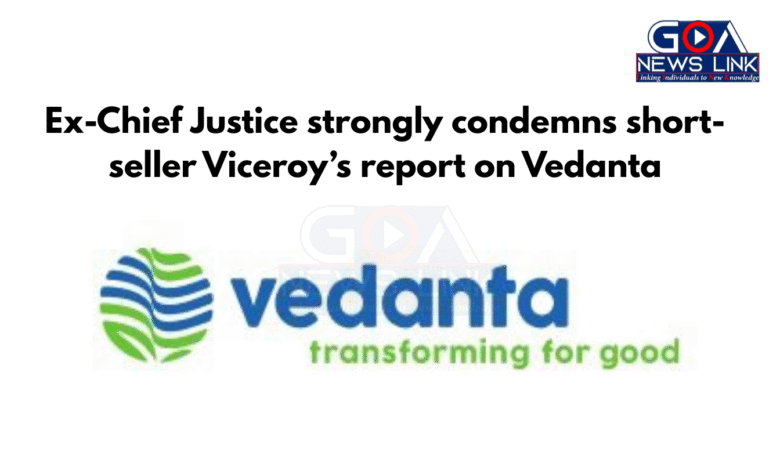
Ex-Chief Justice strongly condemns short-seller Viceroy’s report on Vedanta
Vedanta Limited said that it has received a detailed legal opinion from the former Chief Justice of India (CJI), Dr. D.Y. Chandrachud that finds ‘no wrongdoing’ by the company and in turn questions the credibility of the Viceroy Report. The company has also filed this opinion on the stock exchanges.
The ex-Chief Justice’s opinion can be accessed here:
https://www.vedantalimited.com/public/uploads/15966/VEDLSEIntimationLegalOpinion18July2025signed.pdf
The 20-page opinion said that the recent report by US-based short-seller Viceroy Research Group is defamatory, lacks credibility, is designed to manipulate the market for unlawful financial gain, and will not stand legal scrutiny under Indian jurisprudence. The opinion further states that Vedanta ‘would be well placed to approach the Indian courts for adequate protection and remedies with regard to defamation.’
Dr. Chandrachud’s opinion raises serious questions on the credibility of the researchers and the report as well as the timing of its release. The former CJI notes that ‘the dubious credentials of the “researchers” raise preliminary concerns about the credibility of the report. He also notes that several litigations have been initiated both in India and globally against similar reports published by Viceroy in relation to other companies.’
The opinion states that ‘the timing appears to be strategic and timed to coincide with the group’s positive credit momentum and refinancing success.’ Stating that the launch of the report is likely to have been timed to adversely impact Vedanta’s demerger exercise, the former CJI has said that ‘in particular, the timing coincides with the proposed corporate demerger of certain entities of the Vedanta Group.’
Noting that Viceroy uses ‘inflammatory and defamatory’ language, the opinion says that the short seller’s report includes irresponsible references and innuendos without substantiation. The former CJI emphasized that such language intends to sensationalize rather than present a fair and balanced view.
The opinion, thus, outlines three specific reasons why the Viceroy report lacks credibility. First, the established track record of Viceroy in profiteering from short selling through such reports; Second, the dubious credentials of the researchers behind the publication, and lastly, the suspicious timing of the report’s release, coinciding closely with Vedanta’s proposed demerger, that if successful may result in market upswing, and losses to short sellers.
Dr. Chandrachud has also outlined what appears to be a consistent modus operandi employed by Viceroy. As per the opinion, the short seller first, takes short positions in the stock or bonds of the target company (in this instance, Vedanta Resources)’. This is followed by publishing a so-called “research” report with distorted facts based on publicly available information, without seeking any independent verification from the company. After this, the short-seller profits from the resulting fall in stock prices caused by the panic their report triggers.
He further observed that Viceroy, being a known short-seller, has a well-documented pattern of releasing such market-disruptive reports to influence share prices, making it aware of the foreseeable reputational damage to the targeted entity. In Vedanta’s case too, the statements in the report have attempted to damage corporate credibility.
Dr. Chandrachud stated that ‘there is no evidence that the report was motivated by public interest; instead, it appears to have been driven by an intent to manipulate the market.’ He further noted that ‘Vedanta would be well within its rights to initiate proceedings against both the organisation and its researchers’.
Dr. Chandrachud’s opinion states that Indian companies, particularly listed companies, operate within a tightly regulated environment that is ‘not only intended to deter misconduct but also promote ethical and responsible business conduct.’ Despite this well-structured system, ‘malicious and misleading reports such as the one published by Viceroy seek to dilute confidence in India’s corporate governance standards by falsely portraying regulated entities like Vedanta as non-compliant. Such attempts not only aim to damage the reputation of individual companies but also undermine the integrity of India’s regulatory institutions and erode trust in its markets.’
In his conclusion, Dr. Chandrachud has noted that, as a listed entity, Vedanta operates under a robust and multi layered regulatory framework, with no adverse findings from any regulator or credit rating agency to date. “Vedanta has stated that its disclosures to regulatory authorities are made in compliance with applicable laws and regulatory fiing requirements. Given the absence of verified evidence and the fact that much of the Information in the Report is drawn from public disclosures, it does not, on its face, disclose any credible basis for regulatory action including investigations,” he said.
Despite the Viceroy report, global brokerage firms including JP Morgan, Bank of America and Barclays have maintained their positive ratings on the Vedanta Group entities, citing improved credit profile and attractive valuation.
Rating agencies CRISIL and ICRA reaffirmed their credit ratings for Vedanta. CRISIL maintained AA rating for Vedanta and AAA for Hindustan Zinc Ltd, while ICRA maintained Vedanta’s rating at AA.









